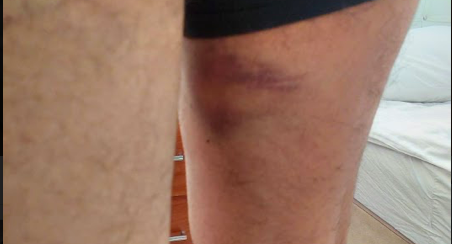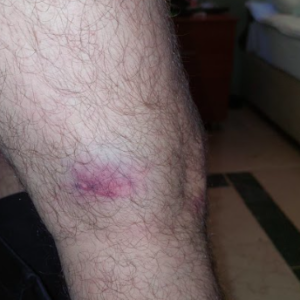On January 20, 2022, the respondent, a 23-year-old Moroccan man, was pushed back with seven other people from Dikaia, Greece to Kapikule, Turkey. He and the other men, who were all Moroccan and ranged in age from 22 to 28 years old, left Edirne around 7 pm on January 19, planning to cross to Bulgaria via Greece and then take a bus to Sofia. They walked about five or six kilometers until they reached the border at 10 pm. There, they spent between 30 minutes and an hour waiting to see if there were any border police patrolling the area, but all they saw was a camera on a windmill near where they crossed.
The respondent recounted that at around 11 pm:
“We all made it across and we started walking after we jumped. We lost one of our bags between the old and new fences, but we couldn’t wait anymore because we were afraid that they would catch us. Then, we tried to run and hide in a dry riverbed next to the fence.”
The men remained hidden for about five minutes and then began a seven-hour walk through Greek territory. The respondent recalled:
“First, we started walking on muddy ground, then we found an unpaved road that we started walking on. We passed by vineyards and cotton fields until we arrived at a spot near a church. We rested close to it and then continued walking. We passed by Nea Vyssa but we didn’t go into the city—just near to it—then we crossed a paved road and kept walking until we decided to have another rest. There, we got caught.”
The men had stopped to rest at around 5 am in a valley, at a spot near a dirt road among the trees. After resting for about 20 minutes, the respondent said:
“We saw a car parked near to us on the unpaved road and another car came too. We could see it, but the car’s lights were off. Then, we started seeing flashing lights around us heading directly to where we were hiding. Then, they came right in front of us and told us to come out from our hiding spot. They were holding weapons, but once they realized that we were just trying to cross they moved the weapon from our faces.”
The respondent recalled seeing four men dressed in sage green uniforms consisting of jackets, pants, and black boots, with “police” written on their chests and both an insignia and Greek flag on their arms. He also saw two men dressed in blue uniforms with “police” written on the left side of their chests wearing hats and goggles that looked like night vision goggles. Finally, there were two other men dressed in black uniforms wearing balaclavas.
After the uniformed men told the group to come out, they also told them to show their phones and put them on the ground. One of the men wearing a black uniform asked them questions in English, including how they crossed and where they were from. The respondent recalled:
“Once we said we were Moroccan, the man wearing the black uniform kicked me on my shoulders and then he pointed his gun at my face and held it against my cheek and then he kicked me again on my back.”
The man in the black uniform reportedly kept kicking him and one other man wearing a sage green uniform kicked his friend for around 10 seconds. The group stayed there for 10 minutes, at which point the uniformed men told them to stand up and walk to the cars, about two minutes away. There, the group was ordered to sit and wait for over 30 minutes next to a white and blue Nissan Qashqai that had “police” written on the side of it and an unmarked black Jeep Cherokee. While they were waiting, the eight uniformed men smoked and reportedly spoke to each other in Greek. Finally, an unmarked red Mercedes van arrived, which the group was forced to get into.
The respondent reports that the men wearing Greek police uniforms loaded the group into the van’s trunk, which was dirty and dark and measured about three by four meters. The drivers initially stayed out of sight in the front, but the respondent said that when he was eventually let out he saw two additional men wearing civilian clothes and balaclavas. Though the van’s trunk was windowless, the respondent and his companions were able to see outside through a small hole in the door of the trunk while they drove. He remembered seeing lights and hilly terrain outside, said the road was paved until around 200 meters before they stopped, and observed that the driving was “fast.”
Finally, they arrived at the river, where they found around 17 other people sitting on the ground. The respondent said they were of Syrian and Afghan origin, ranging in age from six to 40 years old, including one child and two women. He said there were also 10 men: four people wearing green camouflage uniforms resembling Greek soldiers and six were wearing civilian clothes with balaclavas and were holding branches.
The respondent recounted, “Once they took us out from the trunk, the men wearing balaclavas and civilian clothes started beating us with the branches.” The respondent described that he and his seven traveling companions were beaten for around 10 minutes. Then, the men searched them and took their bags, shoes, and money; the respondent had 100 euros taken from him and said nothing was ever returned. In addition to Greek and English, the respondent heard the men in balaclavas and uniforms speaking both Turkish and Arabic with a Syrian accent.
Finally, the two groups were put, nine at a time, into a three-by-two-meter plastic blue camouflage boat and taken to the other side. The boat had no engine and was instead reportedly paddled by two of the men wearing civilian clothes and balaclavas. The respondent said the boat was mostly stable, but that “sometimes when they didn’t paddle, it felt like it would flip over in the river.”
The respondent was in the last group to be pushed back and said everyone from both groups was pushed back as well. He said:
“Once we got to the Turkish shore, we started running and found ourselves near Kapıkule. We thanked God because they pushed us back close to Edirne. I want to know why they hate us and don’t accept us. We only want a chance to live as normal human beings. Why do they humiliate us in this way?”
When asked if he asked for asylum, he replied:
“No one can ask for asylum. If you are looking to get beaten up then just talk without them asking you to talk. They are trained to beat and kill people, not to protect them.”


